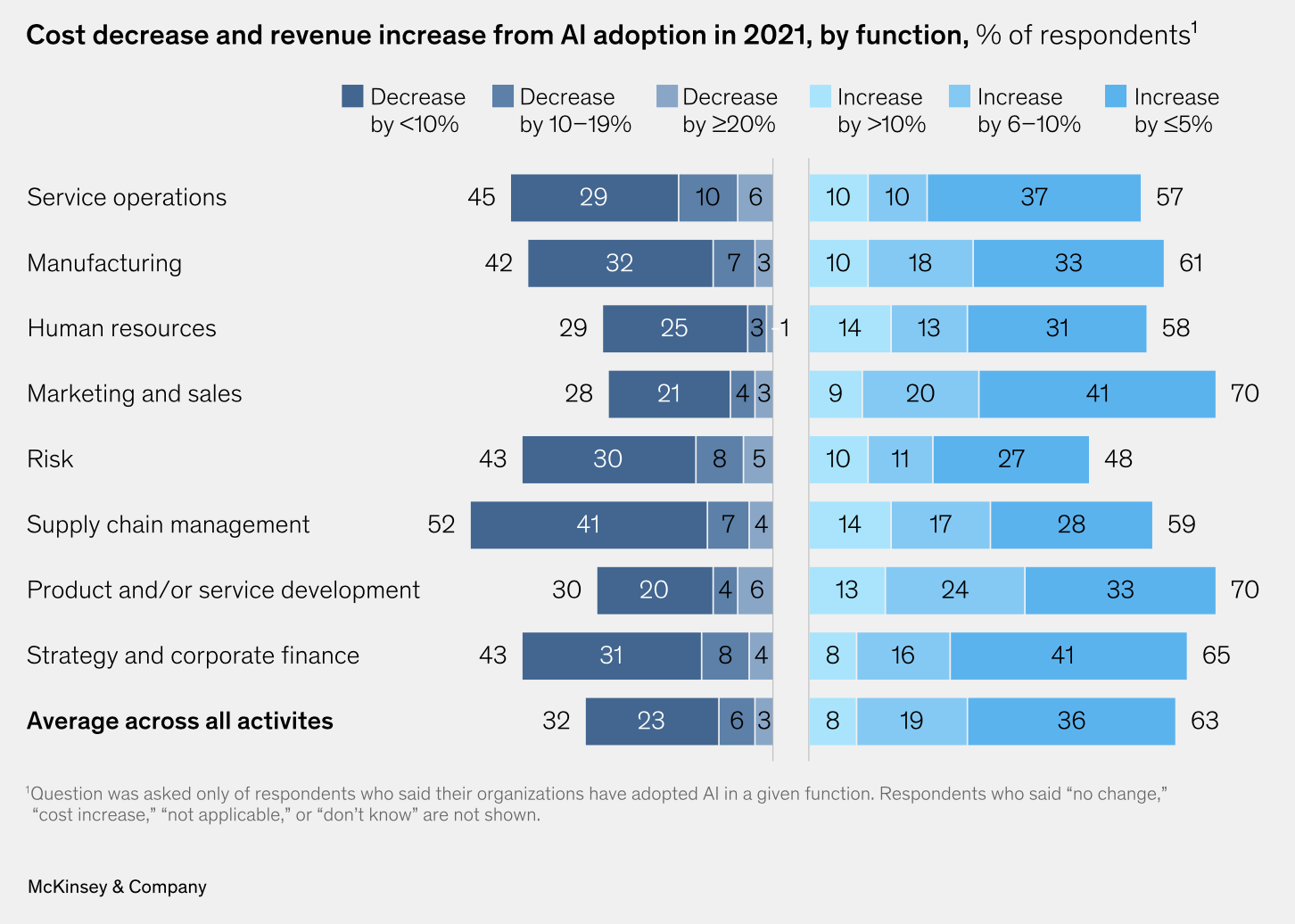Where AI Can Save Businesses the Most Money
Businesses that embrace AI can find increased productivity, creativity and cost savings – if they commit and manage the risks.


Profit and prosper with the best of Kiplinger's advice on investing, taxes, retirement, personal finance and much more. Delivered daily. Enter your email in the box and click Sign Me Up.
You are now subscribed
Your newsletter sign-up was successful
Want to add more newsletters?

Delivered daily
Kiplinger Today
Profit and prosper with the best of Kiplinger's advice on investing, taxes, retirement, personal finance and much more delivered daily. Smart money moves start here.

Sent five days a week
Kiplinger A Step Ahead
Get practical help to make better financial decisions in your everyday life, from spending to savings on top deals.

Delivered daily
Kiplinger Closing Bell
Get today's biggest financial and investing headlines delivered to your inbox every day the U.S. stock market is open.

Sent twice a week
Kiplinger Adviser Intel
Financial pros across the country share best practices and fresh tactics to preserve and grow your wealth.

Delivered weekly
Kiplinger Tax Tips
Trim your federal and state tax bills with practical tax-planning and tax-cutting strategies.

Sent twice a week
Kiplinger Retirement Tips
Your twice-a-week guide to planning and enjoying a financially secure and richly rewarding retirement

Sent bimonthly.
Kiplinger Adviser Angle
Insights for advisers, wealth managers and other financial professionals.

Sent twice a week
Kiplinger Investing Weekly
Your twice-a-week roundup of promising stocks, funds, companies and industries you should consider, ones you should avoid, and why.

Sent weekly for six weeks
Kiplinger Invest for Retirement
Your step-by-step six-part series on how to invest for retirement, from devising a successful strategy to exactly which investments to choose.
AI is slowly changing the way many industries do business. More and more firms around the globe are adopting artificial intelligence solutions and starting to see a return on their investments, in terms of increased productivity, efficiency and even creativity. But which sectors have the most disruption potential, and just how much could AI pay off in real cost savings?
AI Starting to Pay Real Dividends for Businesses
A 2022 NewVantage Partners survey of senior data and technology executives revealed that 92% of large companies registered significant returns on AI and data investments in 2022, double the reported rate from a previous 2017 study.
In that same study, 92% of respondents reported boosting their investments in data and AI, and 26% percent of companies interviewed said they utilize AI systems across their entire operations, which is more than double the 12% reported in the previous year's study.
From just $107.88 $24.99 for Kiplinger Personal Finance
Become a smarter, better informed investor. Subscribe from just $107.88 $24.99, plus get up to 4 Special Issues

Sign up for Kiplinger’s Free Newsletters
Profit and prosper with the best of expert advice on investing, taxes, retirement, personal finance and more - straight to your e-mail.
Profit and prosper with the best of expert advice - straight to your e-mail.
A 2022 McKinsey survey on the state of AI found notable economic return on AI investment across a strong majority responding companies. Of the companies surveyed, 63% reported at least a 5% annual revenue increase in 2021 thanks to AI adoption. Finally, 32% of survey respondents claimed AI-driven cost decreases of up to 20%+ year over year.

Manufacturing
An analysis by Boston Consulting Group (BCG) found that use of AI can reduce industrial producers’ conversion costs, or the cost of changing raw materials into finished goods, by up to 20%. Up to 70% of the projected cost reduction would result from higher workforce productivity. BCG also found that producers can use AI to micro-target specific customers with new products that are delivered on much shorter timelines, leading to increased sales.
BCG’s study interviewed more than 1,000 industrial executives and managers, who expressed the most enthusiasm for AI improvements in the following categories:
- Engineering
- Supply chain management
- Production
- Maintenance
- Quality Control
Health Care
Widespread adoption of artificial intelligence across the health care sector could save the U.S. $360 billion annually, a recent report from McKinsey and Harvard researchers concluded.
Challenges include a broad mistrust of AI among patients and doctors and an incredible breadth of data types to analyze. But the researchers project a future where more and more parts of the health care sector adopt AI for critical functions, producing financial benefits as well as qualitative improvements like better care and more patient satisfaction.
Supply Chain/Logistics
AI has huge potential when it comes to changing the way supply chains are run by consolidating services, improving customer experience and ensuring businesses know what they pay before they ship, according to Forbes. Frazer Kinsley, CEO of Hook Logistics, told Forbes the sector is a "prime candidate" for AI in particular because it uses a lot of data but is "behind technologically," so there is potential.
Kinsley continued, “The expectation from customers for speed is becoming faster and faster, so communication on tracking and deliveries is extremely important to buffer potential lapses.”
Small Business
AI solutions aren't just for giant multinationals. Small businesses can also find cost savings and greater efficiencies by being strategic with artificial intelligence. A 2022 study from online business directory Yell pegged the annual cost savings from AI at the equivalent of $35,000 per business.
Founder John Winner recently wrote for Kiplinger about the benefits of ChatGPT for small businesses, for example, saying it could fill labor gaps and help optimize work.
AI services provider Levity suggests the following light-touch artificial intelligence implementations that even small to medium sized businesses can implement:
- Email marketing: Tools like Zeta Global, Seventh Sense and Automizy allow businesses to improve sales through more fine-tuned personalization and timing of email sends.
- Recruiting and hiring: AI recruitment software like CVViZ or ideal can help streamline hiring process and filter for the right candidates. The AI learns from decisions you take and optimizes its candidate assessments. This can reduce the costs of HR process and increases time for direct interaction with preferred candidates.
- Customer service: AI chatbot providers GetJenny and LivePerson help businesses can save money and provide 24/7 support with relatively little effort. Chatbots can answer repetitive customer questions and reduce research per inquiry, freeing up employees for more demanding tasks.
- Invoice management: AI-based invoice management systems like Rossum or Abacus can help automate time-consuming tasks like data extraction and invoice separation.
The Bottom Line
AI adoption is not without risk to an organization's many stakeholders. New technologies always brings the potential to replace or eliminate certain jobs, or at least to introduce significant new training requirements among existing employees.
The New York Times reports that AI is emerging as sort of industrial revolution for white collar workers, who worry about the thin line between being more productive and becoming obsolete. Deloitte estimates that widespread adoption of AI could "free up" 30% of government employees' time within five to seven years. Such findings might sound more like a threat than a helping hand to an anxious workforce.
In addition to potential employee concerns, AI can present a unique set of risks to companies. The UPenn-Wharton Artificial Intelligence Risk & Governance Working Group singles out privacy attacks, training data poisoning, incorrect outputs, bias, poor data quality, and policy non-compliance as primary threats to successful AI implementation. More worryingly, McKinsey's annual AI report reveals that most organizations lack a comprehensive risk strategy. Only 51% of AI-using organizations are working to mitigate cybersecurity threats, and a mere 28% actively address employee and customer privacy risks.
Still, the business case for AI transformation is strong, if used appropriately. McKinsey's AI report also shows consistent bottom-line value of AI adoption across survey respondents in manufacturing, risk, marketing, sales, product and service development, strategy, corporate finance, and especially supply chain management. And the NewVantage Partners survey demonstrates dramatic improvement in large firms' AI investment returns in just a few short years.
Going forward, companies will have to balance AI's growing economic returns against its growing risks, both technological and human.
Related Content
Profit and prosper with the best of Kiplinger's advice on investing, taxes, retirement, personal finance and much more. Delivered daily. Enter your email in the box and click Sign Me Up.

Ben Demers manages digital content and engagement at Kiplinger, informing readers through a range of personal finance articles, e-newsletters, social media, syndicated content, and videos. He is passionate about helping people lead their best lives through sound financial behavior, particularly saving money at home and avoiding scams and identity theft. Ben graduated with an M.P.S. from Georgetown University and a B.A. from Vassar College. He joined Kiplinger in May 2017.
-
 Quiz: Do You Know How to Avoid the "Medigap Trap?"
Quiz: Do You Know How to Avoid the "Medigap Trap?"Quiz Test your basic knowledge of the "Medigap Trap" in our quick quiz.
-
 5 Top Tax-Efficient Mutual Funds for Smarter Investing
5 Top Tax-Efficient Mutual Funds for Smarter InvestingMutual funds are many things, but "tax-friendly" usually isn't one of them. These are the exceptions.
-
 AI Sparks Existential Crisis for Software Stocks
AI Sparks Existential Crisis for Software StocksThe Kiplinger Letter Fears that SaaS subscription software could be rendered obsolete by artificial intelligence make investors jittery.